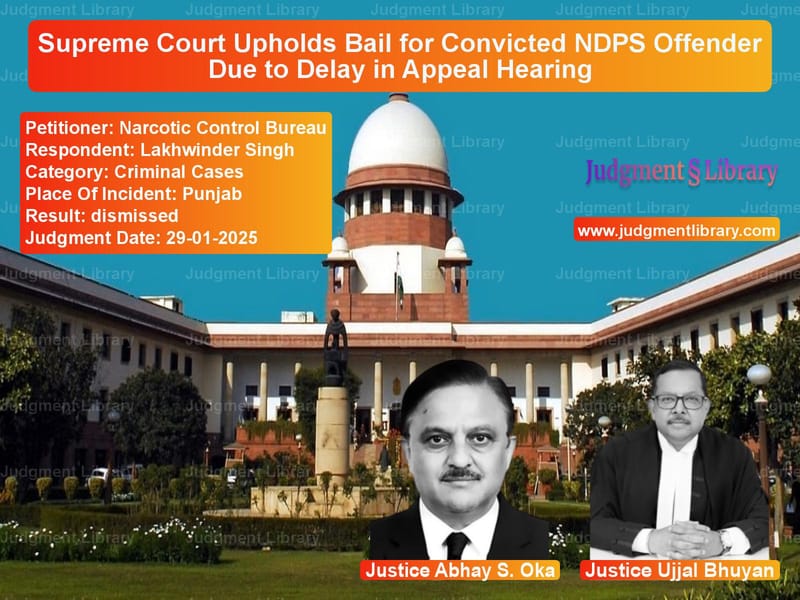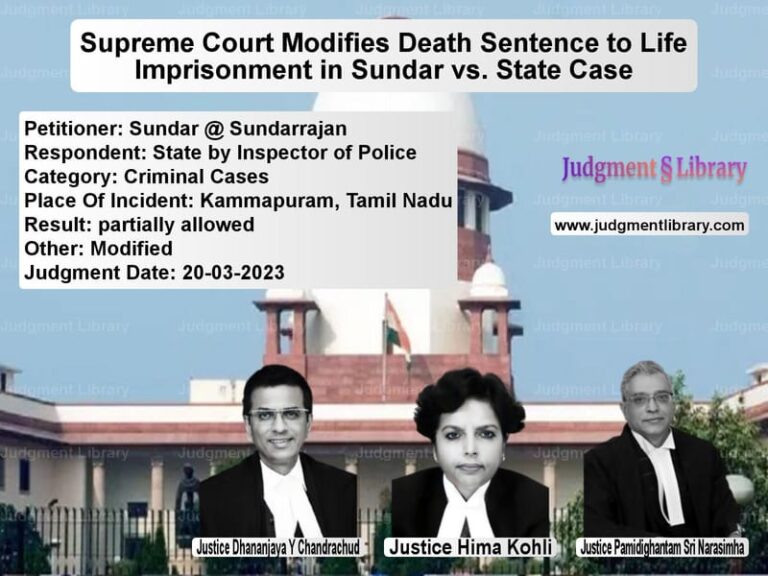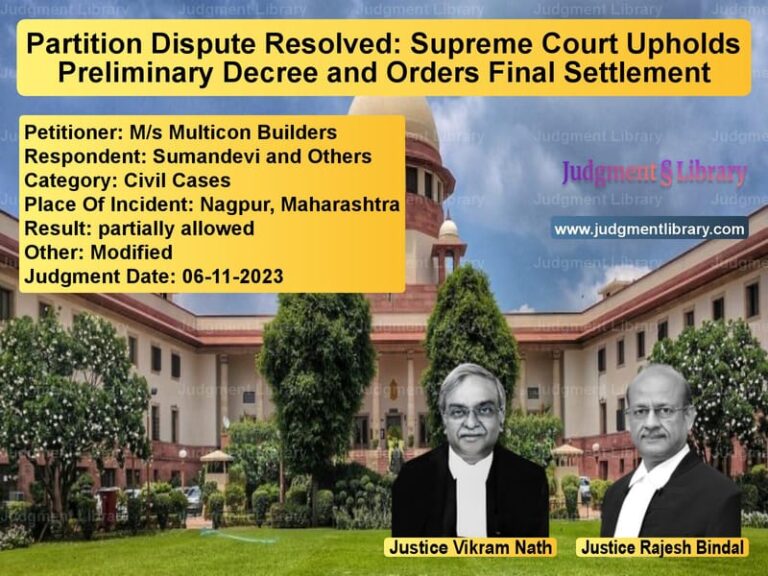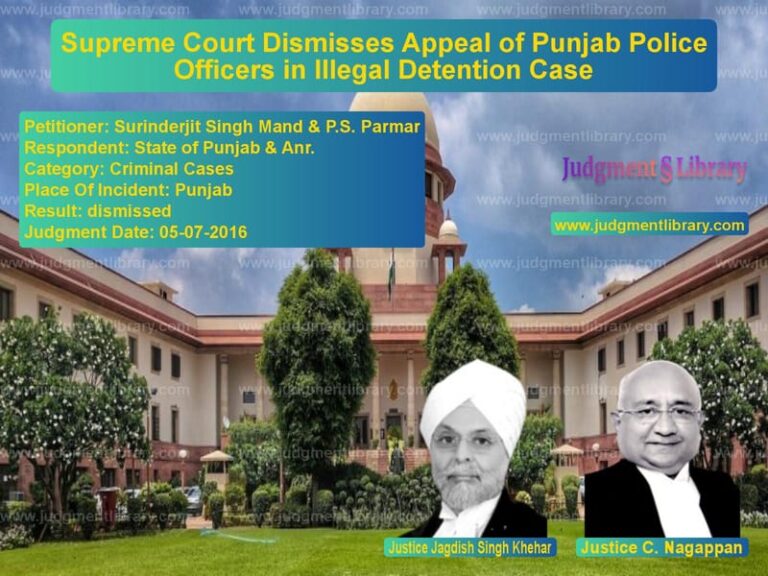Supreme Court Upholds Bail for Convicted NDPS Offender Due to Delay in Appeal Hearing
The Supreme Court of India recently ruled in the case of Narcotic Control Bureau vs. Lakhwinder Singh, addressing the issue of granting bail to an accused convicted under the Narcotic Drugs and Psychotropic Substances Act, 1985 (NDPS Act). The Court upheld the High Court’s decision to grant bail to Lakhwinder Singh despite him not completing half of his 10-year sentence. The ruling highlights the balance between stringent provisions of the NDPS Act and the fundamental right to liberty under Article 21 of the Constitution.
Background of the Case
Lakhwinder Singh was convicted under the NDPS Act and sentenced to 10 years of rigorous imprisonment. He had served approximately 4.5 years of his sentence when he approached the High Court for bail pending appeal.
The High Court noted that his appeal, filed in 2021, was unlikely to be heard before the completion of his sentence. Thus, considering the prolonged delay, the Court granted bail, suspending his sentence.
The Narcotic Control Bureau (NCB) challenged this decision before the Supreme Court, arguing that under the NDPS Act, bail should not be granted unless the accused had served at least half of the sentence.
Arguments by the Appellant (NCB)
The learned Additional Solicitor General (ASG) appearing for NCB contended:
- The High Court’s decision was contrary to the Supreme Court ruling in Supreme Court Legal Aid Committee Representing Undertrial Prisoners vs. Union of India (1994), which set specific conditions for granting bail to NDPS convicts.
- As per the 1994 ruling, an undertrial or convicted person is entitled to bail only if they have served at least half of their sentence.
- Since Lakhwinder Singh had only served 4.5 years out of his 10-year sentence, the High Court erred in granting bail.
- The NDPS Act contains strict provisions under Section 37, which restricts bail unless the Court is satisfied that there are reasonable grounds to believe that the accused is not guilty.
Arguments by the Respondent (Lakhwinder Singh)
The defense argued:
- The High Court was correct in granting bail, as the prolonged delay in hearing the appeal violated the right to a speedy trial under Article 21.
- The Supreme Court’s 1994 ruling was a one-time direction and does not restrict courts from granting bail in exceptional circumstances.
- Strict application of Section 37 of the NDPS Act should not override constitutional rights.
- If bail is denied solely on procedural grounds, it would amount to forcing a convict to serve the entire sentence before appeal disposal.
Supreme Court’s Analysis and Judgment
1. Right to Bail and Delay in Appeal Hearing
The Supreme Court acknowledged that the right to appeal is a fundamental right and denying bail solely based on procedural constraints would be unjust.
“In cases where the appeal is not likely to be heard before the accused serves their entire sentence, granting bail is essential to prevent the miscarriage of justice.”
2. Clarification on the 1994 Ruling
The Court clarified that the directives in the Supreme Court Legal Aid Committee case were issued as a one-time measure and were not meant to curtail judicial discretion:
“The 1994 ruling does not limit the powers of the appellate courts to grant bail if there are compelling reasons, such as a long delay in appeal disposal.”
3. Balancing Section 37 of NDPS Act with Constitutional Rights
While acknowledging the strict bail provisions under Section 37 of the NDPS Act, the Court held that the right to liberty under Article 21 must prevail when delays make it impractical to wait for appeal disposal.
“If an accused has undergone a substantial part of the sentence, and the appeal is not likely to be heard soon, denying bail would violate Article 21.”
4. Precedent on Long Incarceration and Bail
The Court referred to its decision in Dadu vs. State of Maharashtra (2000), where it was held that bail must be granted when prolonged incarceration violates fundamental rights.
5. Protection Against Bail Misuse
The Court noted that if the respondent misuses bail, NCB can always apply for its cancellation.
Final Judgment
The Supreme Court dismissed NCB’s appeal and upheld the High Court’s decision to grant bail:
“Considering the facts, the appeal is dismissed. However, if the respondent misuses the liberty granted to him, the appellant is at liberty to apply for cancellation of bail.”
Conclusion
This judgment reinforces the principle that prolonged incarceration without a timely appeal hearing is unjust. The ruling ensures that courts balance statutory bail restrictions with constitutional guarantees, preventing undue hardship to convicts awaiting appeal.
Petitioner Name: Narcotic Control Bureau.Respondent Name: Lakhwinder Singh.Judgment By: Justice Abhay S. Oka, Justice Ujjal Bhuyan.Place Of Incident: Punjab.Judgment Date: 29-01-2025.
Don’t miss out on the full details! Download the complete judgment in PDF format below and gain valuable insights instantly!
Download Judgment: narcotic-control-bur-vs-lakhwinder-singh-supreme-court-of-india-judgment-dated-29-01-2025.pdf
Directly Download Judgment: Directly download this Judgment
See all petitions in Bail and Anticipatory Bail
See all petitions in Drug Possession Cases
See all petitions in Legal Malpractice
See all petitions in Judgment by Abhay S. Oka
See all petitions in Judgment by Ujjal Bhuyan
See all petitions in dismissed
See all petitions in supreme court of India judgments January 2025
See all petitions in 2025 judgments
See all posts in Criminal Cases Category
See all allowed petitions in Criminal Cases Category
See all Dismissed petitions in Criminal Cases Category
See all partially allowed petitions in Criminal Cases Category







